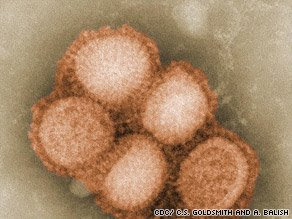
In a race to beat the flu season, medical institutes across the United States will begin human trials for a new H1N1 flu vaccine starting in early August, the University of Maryland announced Wednesday.
Concern about the H1N1 virus grew after it spread quickly around the globe earlier this year.
Concern about the H1N1 virus grew after it spread quickly around the globe earlier this year.
In the hope of getting the vaccine to those who will need it most by October, the clinical trials will enroll as many as 1,000 adults and children at 10 centers nationwide, said officials at the Center for Vaccine Development at the University of Maryland School of Medicine, which will lead the effort. The trials will measure the safety and effectiveness of the vaccine.
The research is a first step toward U.S. health officials' goal of developing a safe and effective vaccine against H1N1, also known as swine flu, which has been declared a global pandemic by the World Health Organization
The time frame for developing a vaccine is a tight one.
'It's going to be close,' said Dr. Anthony Fauci, director of the National Institute of Allergy and Infectious Diseases at the National Institutes of Health. 'I believe it can be [ready by October] if things run smoothly. We hope they will, but you never can tell when you're dealing with biological phenomena like making vaccines and administering them.'
The announcement of the U.S. trials followed the announcement earlier this week, by an Australian company, CSL Ltd., of the first human trials of a swine flu vaccine.
CNN.com: U.S. trials for H1N1 vaccine announced
 More than half of children taking the swine flu drug Tamiflu experience side-effects such as nausea and nightmares, research suggests.
More than half of children taking the swine flu drug Tamiflu experience side-effects such as nausea and nightmares, research suggests.
























 The United States is ready to announce another $1 billion in orders for swine flu vaccinations.
The United States is ready to announce another $1 billion in orders for swine flu vaccinations.




 The rising number of swine flu cases mean trying to contain the virus is no longer an option, the government says.
The rising number of swine flu cases mean trying to contain the virus is no longer an option, the government says.



